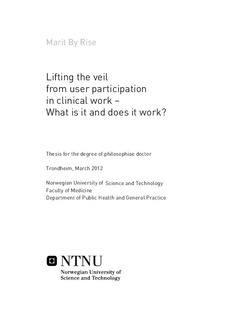| dc.contributor.advisor | Steinsbekk, Aslak | nb_NO |
| dc.contributor.advisor | Grimstad, Hilde | nb_NO |
| dc.contributor.advisor | Eriksen, Lasse | nb_NO |
| dc.contributor.author | Rise, Marit By | nb_NO |
| dc.date.accessioned | 2014-12-19T14:22:49Z | |
| dc.date.available | 2014-12-19T14:22:49Z | |
| dc.date.created | 2012-03-27 | nb_NO |
| dc.date.issued | 2012 | nb_NO |
| dc.identifier | 512268 | nb_NO |
| dc.identifier.isbn | 1503-8181 | nb_NO |
| dc.identifier.uri | http://hdl.handle.net/11250/264484 | |
| dc.description.abstract | User participation in health care has been part of a large societal development where patient’s rights have challenged the history of paternalism. Users’ participation has been legislated in many countries and proposes that participation shall take place both on the system level and in individual treatment. Many theoretical and ideological arguments for user participation have been made and many definitions have been formulated. What user participation implies in the clinic and the effect of user participation initiatives in clinical work is however still unclear. The aim of this thesis was therefore to contribute to lift the veil from user participation in clinical work. The aim focused on two main aspects; what is user participation - and does it work?
To answer the main aim four studies were conducted mainly in a mental health hospital (regional psychiatric centre) in central Norway. A total of 635 health service users and providers participated in the studies. The four studies included two qualitative studies exploring how health service users and providers defined user participation in general and in mental health services in particular (definitions and perspectives on participation). The third study was a quasi-experimental study investigating the effect of implementing a development plan to enhance user participation in a mental health hospital on professionals’ knowledge, practice and attitudes (effect on a system level). The fourth study was a randomised controlled trial investigating the short-term effect of using patient feedback in out-patient mental health treatment sessions on treatment alliance and patient satisfaction (effect on an individual level).
The results from the qualitative studies showed that respect, dialogue, and shared decisionmaking were core aspects of user participation and that the decision-making part was negotiated and redefined during poor phases of mental illness. The quasi-experimental study and the randomised controlled trial showed little or no effect of the investigated user participation interventions.
As a whole this thesis has illuminated respect as a fundamental and under-communicated aspect of user participation in the clinic, and decision-making as a crucial yet vulnerable and challenging part of user participation. The thesis has contributed with studies to enlarge the evidence-base on effect of user participation on system and individual level. Two problem areas in effect studies have been illuminated. Implementation processes on a system level need to be followed closely, and there are potential problems with the outcome measures used to measure the effect of user participation. Respect must be investigated further as a fundament of user participation, and users’ perception of being respected should become one of the hallmarks of good health services. Decision-making must be seen as an integrated process where respect and communication are more important than who makes the final decisions. There is still a need for more high quality studies on the effect of user participation, especially on the system level. | nb_NO |
| dc.language | eng | nb_NO |
| dc.publisher | Norwegian University of Science and Technology | nb_NO |
| dc.relation.ispartofseries | Doktoravhandlinger ved NTNU, 1503-8181; 2012:86 | nb_NO |
| dc.relation.haspart | Rise, Marit By; Grimstad, Hilde; Solbjør, Marit; Steinsbekk, Aslak. Effect of an institutional development plan for user participation on professionals' knowledge, practice, and attitudes. A controlled study.. BMC health services research. (ISSN 1472-6963). 11: 296, 2011. <a href='http://dx.doi.org/10.1186/1472-6963-11-296'>10.1186/1472-6963-11-296</a>. <a href='http://www.ncbi.nlm.nih.gov/pubmed/22047466'>22047466</a>. | nb_NO |
| dc.relation.haspart | Rise, Marit By; Solbjør, Marit; Lara, Mariela C; Westerlund, Heidi; Grimstad, Hilde; Steinsbekk, Aslak. Same description, different values. How service users and providers define patient and public involvement in health care.. Health Expectations. (ISSN 1369-6513), 2011. <a href='http://dx.doi.org/10.1111/j.1369-7625.2011.00713.x'>10.1111/j.1369-7625.2011.00713.x</a>. <a href='http://www.ncbi.nlm.nih.gov/pubmed/21838833'>21838833</a>. | nb_NO |
| dc.relation.haspart | Rise, MB; Eriksen, L; Grimstad, H; Steinsbekk, A. The short-term effect on alliance and satisfaction of using patiant feedback scales in mental health out-patient treatment. A randomised controlled trail.. . | nb_NO |
| dc.relation.haspart | Solbjør, Marit; Rise, Marit By; Westerlund, Heidi; Steinsbekk, Aslak. Patient participation in mental healthcare. International Journal of Social Psychiatry. (ISSN 0020-7640), 2011. <a href='http://dx.doi.org/10.1177/0020764011423464'>10.1177/0020764011423464</a>. <a href='http://www.ncbi.nlm.nih.gov/pubmed/22013139'>22013139</a>. | nb_NO |
| dc.title | Lifting the veil from user participation in clinical work – What is it and does it work? | nb_NO |
| dc.type | Doctoral thesis | nb_NO |
| dc.source.pagenumber | 89 | nb_NO |
| dc.contributor.department | Norges teknisk-naturvitenskapelige universitet, Det medisinske fakultet, Institutt for samfunnsmedisin | nb_NO |
| dc.description.degree | PhD i samfunnsmedisin | nb_NO |
| dc.description.degree | PhD in Community Medicine | en_GB |
